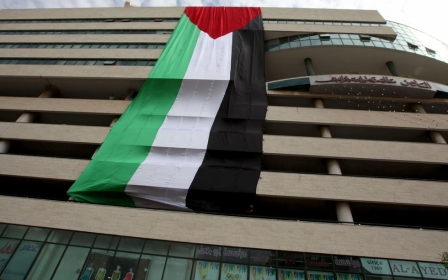Israeli forces kill 13-year-old in West Bank clashes

A 13-year-old Palestinian has been killed by Israeli gunfire during clashes in the occupied West Bank, the second Palestinian teenager to die in 24 hours.
The boy, named as Abdel Rahman Obeidallah, was killed by a gunshot to the chest near Bethlehem's Aida refugee camp on Monday as violence spiked in East Jerusalem and the occupied West Bank.
Witnesses told Middle East Eye that the child was walking to a shop during the clashes when he was shot. Doctors at the local hospital said that Abdel Raham arrived in critical condition and died soon after. Another young man was reportedly shot in the thigh in the clashes, and is in moderate condition.
Protests have since broken out in the refugee camp, with several hundred people taking to the streets shouting slogans, including: "We weren't born for humiliation, we were born to hold guns." Young men also threw stones at Israeli forces.
The Fatah movement has also called for a comprehensive city-wide strike to take place on Tuesday in protest the against recent violence.
2nd killing in 24 hours
The 13-year-old is the second Palestinian killed by Israeli soldiers over the past 24 hours. Huzeifa Othman Suleiman, 18, was killed on Sunday during clashes in Tulkarem, according to medics and Palestinian police sources.
The Anadolu news agency reported Hamas as confirming that Suleiman was an activist linked to the group. The Israeli military said its forces had clashed with up to 200 youths in Tulkarem who belonged to Hamas. "They [army] used riot dispersal means. They fired rounds towards three rioters that were throwing firebombs and confirmed hits," said an Israeli army spokesperson.
The Red Crescent organisation on Monday reported 456 Palestinians injured over the last two days alone by Israeli live fire and rubber bullets.
The violence mounted over the weekend after the killings of two Israelis in Jerusalem's Old City, prompting Israel to close the area to non-resident Palestinians and step up a show of force.
Faiz Abu Rmeleh, a photographer who lives in the Old City, told Middle East Eye that the area's streets were deserted on Monday morning as a result of Israeli security measures put in place after Saturday's attack.
"No one can get in," he said. "Movement is very difficult. Some small streets have three big Israeli checkpoints and the Al-Aqsa Mosque is blocked to anyone other than women and men over 50 years old. Shops are closed and anyone wanting to come from outside who is not a resident is not allowed. This means no one can work, children cannot get to their schools."
"Al-Wad street to Al-Aqsa is closed off. Damascus Gate is heavily patrolled. I cannot move freely. They have stopped our lives."
Clashes were also reported in the Shuafat area of north-east Jerusalem. Three people were injured, Palestinian sources told MEE.
The mainly Palestinian area was home to Mohammed Abu Khdeir, a 17-year-old who was burnt alive by ultra-right-wing settlers last year. His death was believed to have been carried out in response to the killing of three Israeli settler teenagers in the West Bank.
Palestinian President Mahmoud Abbas on Monday accused Israel of escalating tensions, in his first reaction since a recent spike in unrest.
"The Israeli side and its government have an interest in dragging things into a cycle of violence and are trying through escalation at Al-Aqsa and settler attacks to escape their political impasse and international isolation," said the statement from Abbas's office.
The Palestinian president's comments come a day after Israeli Prime Minister Benjamin Netanyahu said that Israel was "waging a fight to the death against Palestinian terror," and ordered tough new measures after the killing of the two Israelis in Jerusalem.
"These steps include, among others, speeded-up demolition of terrorists' homes," he said in a video address distributed by his office.
Netanyahu had convened his ministers of defence and internal security and top security officials immediately after landing back in Israel on Sunday after delivering a speech to the UN General Assembly in New York.
He said he instructed them on steps "to prevent terror and deter and punish the attackers".
They included broader use of detention without trial for suspects, further reinforcement of security forces in Jerusalem and the occupied West Bank, and restraining orders keeping unspecified "inciters" away from the flashpoint Al-Aqsa Mosque compound, which he called by its Jewish name, the Temple Mount.
The Israeli ban in the Old City came hours after a 19-year-old Palestinian, Muhannad Halabi, attacked an Israeli family as they walked in the Old City, killing the father, seriously wounding the mother and lightly injuring their two-year-old child before stabbing another Israeli man to death. He then opened fire at tourists and police before he was shot and killed by policemen.
Al-Quds Brigades, the armed wing of Islamic Jihad, on Monday claimed responsibility for Saturday's attack.
A spokesperson for the group told AFP that Halabi was a member of the organisation, which claimed responsibility for the attack previously attributed to Hamas.
Meanwhile, Israel launched airstrikes in Gaza on Monday after two rockets were fired from the Strip towards Israel on Sunday evening, with one hitting an uninhabited area in southern Israel while another exploded in the sky.
The first rocket hit an open space in Eshkol Regional Council, near the border, causing no damage. Sirens did not go off since the rocket did not pose a threat.
No casualties were reported in either Gaza or southern Israel.
Stay informed with MEE's newsletters
Sign up to get the latest alerts, insights and analysis, starting with Turkey Unpacked
Middle East Eye delivers independent and unrivalled coverage and analysis of the Middle East, North Africa and beyond. To learn more about republishing this content and the associated fees, please fill out this form. More about MEE can be found here.





